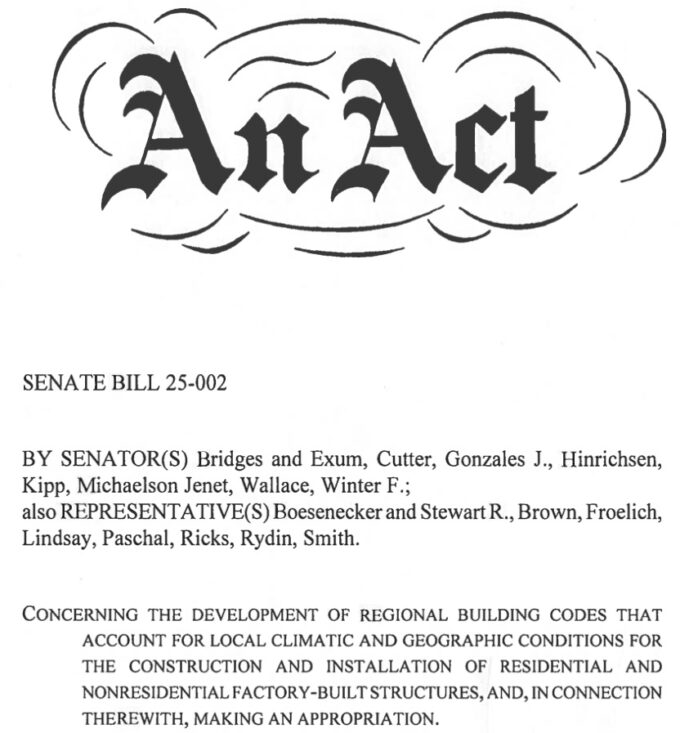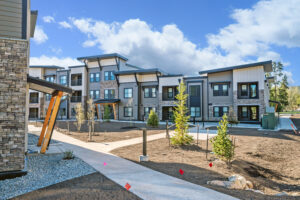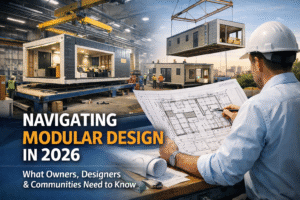Colorado Streamlines Modular Construction with SB25-002
A Path Toward More Affordable Housing and Smarter Regulation
Colorado’s housing crisis has pushed leaders to rethink how we build. Senate Bill 25-002 (SB25-002), passed in 2025, offers a bold response.
This forward-thinking law streamlines modular and offsite construction across Colorado. It addresses high construction costs, conflicting codes, and regulatory delays that hinder housing development.
EVstudio proudly supports these changes. Founding Principal Dean Dalvit serves on the advisory committee guiding implementation. He is committed to improving design, permitting, fabrication, and on-site construction efficiency statewide.
Why SB25-002 Matters
Colorado faces a severe housing affordability problem. Over 30% of Coloradans spend too much of their income on housing. New homes cost more than $480,000 on average.
Modular construction offers faster, cheaper solutions. However, it often runs into local barriers, including overlapping or outdated building codes. SB25-002 solves this by creating consistent, regional rules for factory-built structures.
Key Provisions of the Law
Regional Building Codes for Modular Housing
The Colorado State Housing Board must adopt regional building code standards by July 1, 2026. These standards will reflect:
-
Wind and snow loads
-
Wildfire risk and radon mitigation
-
Thermal zones and fire sprinkler rules
This system improves predictability. It also reduces confusion across municipalities with different requirements.
Limits on Local Overreach
Cities and counties cannot impose stricter rules on modular housing than traditional homes in the same zoning district. This includes setbacks, lot size, and floor area restrictions.
Additionally, local fire, plumbing, and electrical boards may not apply unrelated standards to modular installations unless specifically authorized.
Simplified Permitting and Oversight
Modular manufacturers can now use approved third-party inspectors for plan review and installation verification. The state will certify installers and track performance.
Installers must meet training and licensing requirements. The state will also audit third-party reviewers and hold them accountable.
An Advisory Committee Guides the Process
A 19-member advisory group will help shape Colorado’s regional modular codes. Members include:
-
Local and state building officials
-
Fire officials and engineers
-
Modular manufacturers and developers
-
Architects and housing advocates
EVstudio Principal Dean Dalvit proudly represents the design industry on this committee. His goal is clear: streamline the process without compromising quality or safety.
Better Rules Mean Better Housing
Standardized codes help reduce construction delays and budget overruns. They also create a more predictable environment for developers and investors.
SB25-002 supports innovation while keeping health and safety front and center. It helps Colorado build smarter, faster, and more affordably—especially on constrained or infill sites where modular shines.
What’s Next?
The new regional standards will be adopted by July 1, 2026. In the meantime, the advisory committee will draft recommendations and report back during the 2026 legislative session.
By 2031, the state will evaluate outcomes under the SMART Act and consider future improvements.
EVstudio’s Role in the Future of Modular Design
EVstudio has been a leader in offsite construction and modular design for more than a decade. With integrated architecture, engineering, and surveying services, EVstudio delivers complete solutions for modular development.
Through Dean Dalvit’s role on the advisory committee, EVstudio is actively shaping policy to unlock modular’s full potential. We believe modular design can—and should—deliver affordability, quality, and sustainability for communities across Colorado.
Learn More
Want to know how SB25-002 might impact your next project? Contact EVstudio to start a conversation about modular housing and site-specific solutions.











